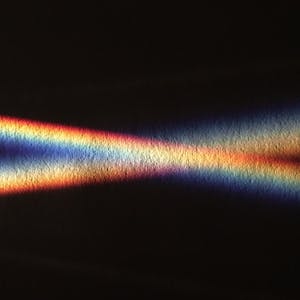This course can also be taken for academic credit as ECEA 5602, part of CU Boulder’s Master of Science in Electrical Engineering degree.Optical instruments are how we see the world, from corrective eyewear to medical endoscopes to cell phone cameras to orbiting telescopes. This course extends what you have learned about first-order, paraxial system design and optical resolution and efficiency with the introduction to real lenses and their imperfections. We begin with a description of how different wavelengths propagate through systems, then move on to aberrations that appear with high angle, non-paraxial systems and how to correct for those problems. The course wraps up with a discussion of optical components beyond lenses and an excellent example of a high-performance optical system – the human eye. The mathematical tools required for analysis of high-performance systems are complicated enough that this course will rely more heavily on OpticStudio by Zemax. This will allow students to analyze systems that are too complicated for the simple analysis thus far introduced in this set of courses.
None
Syllabus
Syllabus - What you will learn from this course
Week 1
Chromatic Aberrations
Week 2
Ray Aberrations
Week 3
Field Curvature and Distortion
Week 4
Techniques for Reduction of Aberrations
Week 5
Optical Components
FAQ
When will I have access to the lectures and assignments?
Access to lectures and assignments depends on your type of enrollment. If you take a course in audit mode, you will be able to see most course materials for free. To access graded assignments and to earn a Certificate, you will need to purchase the Certificate experience, during or after your audit. If you don't see the audit option:
The course may not offer an audit option. You can try a Free Trial instead, or apply for Financial Aid.
The course may offer 'Full Course, No Certificate' instead. This option lets you see all course materials, submit required assessments, and get a final grade. This also means that you will not be able to purchase a Certificate experience.
What will I get if I subscribe to this Specialization?
When you enroll in the course, you get access to all of the courses in the Specialization, and you earn a certificate when you complete the work. Your electronic Certificate will be added to your Accomplishments page - from there, you can print your Certificate or add it to your LinkedIn profile. If you only want to read and view the course content, you can audit the course for free.
Is financial aid available?
Yes. In select learning programs, you can apply for financial aid or a scholarship if you can’t afford the enrollment fee. If fin aid or scholarship is available for your learning program selection, you’ll find a link to apply on the description page.
Reviews
A very good overview with all the necessary information. Good starter into the principles and ends with practical tips for the field.
Great course.Best online course on optics designing. Hope Coursera will launch more courses like this in future
